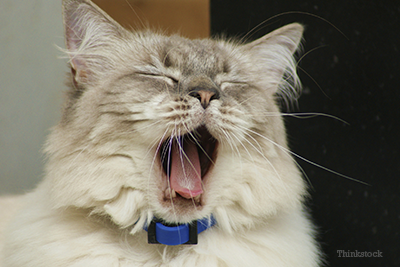 Years ago, veterinarians thought that cats developed heartworm disease far less frequently than dogs did. That misconception was due in large part to two factors. First, heartworms produce a very different disease in cats than in dogs. Second, testing for heartworm disease in cats is performed differently than in dogs. For instance:
Years ago, veterinarians thought that cats developed heartworm disease far less frequently than dogs did. That misconception was due in large part to two factors. First, heartworms produce a very different disease in cats than in dogs. Second, testing for heartworm disease in cats is performed differently than in dogs. For instance:
- In dogs, according to the American Heartworm Society, at least 60% of infective larvae develop into adult heartworms causing disease in the heart and lungs. In cats, very few infective larvae develop into adult heartworms (<10%), and as these immature parasites die, a severe inflammatory disease develops in the lungs.
- Because dogs typically have multiple adult heartworms, antigen tests are used to identify the presence of infection. Cats, on the other hand, can have lung disease even without any adult worms so it is important to use both antibody tests and antigen tests to determine if a cat’s clinical signs are due to heartworm disease.
- Although cats don’t develop adult heartworm infections at the same rate as dogs, according to CAPC, studies suggest that cats are infected with immature stages of heartworms at an infection rate similar to that of dogs.
Today, veterinarians know that just like the adult worms, very young worms can also cause a severe and sometimes acute, life-threatening disease in cats called Heartworm Associated Respiratory Disease (HARD).
What is HARD?
HARD describes a lung disease caused by heartworms in cats. Yes, you read that correctly— lung disease. Adult worms, if present, tend to reside in the blood vessels of the infected cat’s lungs. Additionally, developing immature worms can set off a severe, inflammatory response in the smaller lung blood vessels, in the airways and in the lung tissue itself1.
What are the symptoms of HARD?
Unfortunately the symptoms of HARD can be vague and varied. The American Association of Feline Practitioners says they may include:
- Coughing
- Difficulty breathing
- Lethargy
- Rapid heart rate
- Decreased appetite
- Weight loss
- Vomiting
- Diarrhea
- Blindness
- Collapse
- Convulsions
- Sudden death
That means that the signs of a cat with HARD can be confused with other illnesses from primary gastrointestinal disease to respiratory disease due to bronchitis or asthma.
How is HARD diagnosed?
As discussed, the combination of heartworm antibody and antigen tests can help to make a diagnosis of HARD in a cat with the appropriate history and clinical signs. Additional tests such as Complete Blood Counts (CBCs), thoracic radiographs (chest X-rays), and ultrasound imaging may be helpful in identifying the presence of heartworm disease1.
Treatment and prognosis of HARD
Unfortunately, the medications that are used to kill adult worms in our canine patients are not safe for use in cats. That means that treatment in cats is primarily symptomatic. In asymptomatic or mild cases that may mean just awareness and monitoring. In other cases, anti-inflammatory drugs are used while in severe cases or in acute cases, cardiovascular support, fluids therapy, oxygen administration and intensive care may be necessary1.
Preventing HARD
This devastating disease is often debilitating or even fatal and is essentially untreatable except for symptomatic care. On the other hand, it is very preventable by stopping the development of the infective larvae that are transmitted through mosquito bites. This means the year round use of heartworm control products according to manufacturer directions and veterinary instructions.
Ask your veterinarian about making sure your cat is protected. Learn more about heartworm disease in cats >>
If you have any questions or concerns, you should always visit or call your veterinarian -- they are your best resource to ensure the health and well-being of your pets.
Resources:
